Event themes for DJs are essential concepts that shape the atmosphere and experience of parties and events, influencing music selection, visuals, and audience engagement. The article explores how these themes enhance the DJ experience by fostering emotional connections and creating memorable interactions. It outlines the elements that contribute to successful themes, such as relevance, creativity, and cohesiveness, while also discussing the impact of memorable experiences on event success. Additionally, the article provides insights into various types of themes suitable for different audiences, strategies for effective theme implementation, and best practices for engaging attendees, ultimately emphasizing the importance of thoughtful planning in creating impactful events.
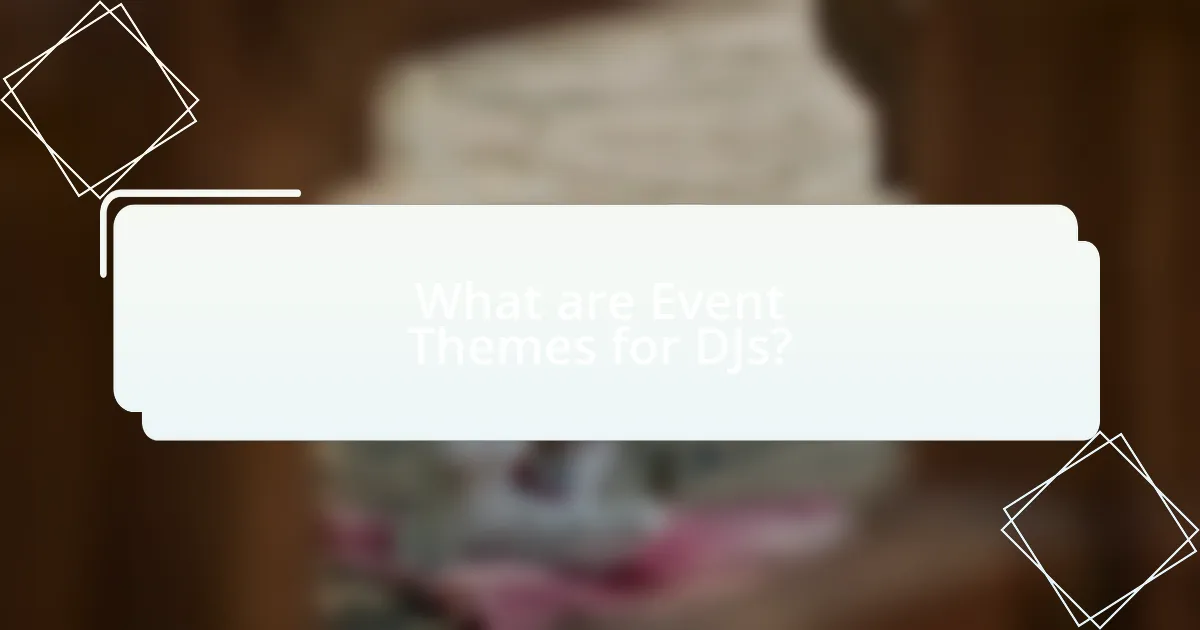
What are Event Themes for DJs?
Event themes for DJs are specific concepts or motifs that guide the overall atmosphere and experience of a party or event. These themes can range from genres like retro, tropical, or electronic to more specific ideas such as masquerade, neon glow, or festival vibes. Each theme influences the music selection, visual elements, and audience engagement strategies, creating a cohesive experience that resonates with attendees. For instance, a tropical theme may feature upbeat reggae and calypso music, while a retro theme might focus on disco and classic hits, enhancing the event’s appeal and memorability.
How do event themes enhance the DJ experience?
Event themes enhance the DJ experience by creating a cohesive atmosphere that engages the audience and elevates the overall event. When a DJ aligns their music selection, visuals, and performance style with a specific theme, it fosters a deeper connection with the audience, making the experience more memorable. For instance, themed events like “80s Night” or “Masquerade Ball” encourage attendees to dress accordingly, which enhances participation and excitement. Research indicates that immersive experiences, such as those created by thematic elements, can increase audience satisfaction and retention, as seen in studies on event marketing and consumer behavior.
What elements contribute to a successful event theme?
A successful event theme is primarily defined by its relevance, creativity, and cohesiveness. Relevance ensures that the theme resonates with the target audience and aligns with the event’s purpose, which is crucial for engagement. Creativity involves unique and innovative ideas that capture attention and create memorable experiences, as evidenced by events like Coachella, which utilizes distinct themes each year to enhance attendee enjoyment. Cohesiveness refers to the consistent application of the theme across all elements of the event, including decor, music, and activities, which fosters a unified atmosphere. Research indicates that events with a strong thematic focus can increase attendee satisfaction by up to 30%, highlighting the importance of these elements in creating impactful experiences.
How do themes influence audience engagement?
Themes significantly influence audience engagement by creating a cohesive atmosphere that resonates with attendees. A well-defined theme can enhance emotional connections, making experiences more memorable and enjoyable. For instance, research indicates that events with strong thematic elements can increase participant satisfaction by up to 30%, as attendees feel more immersed and connected to the experience. This immersion fosters interaction and participation, leading to higher levels of engagement throughout the event.
Why are memorable experiences important for events?
Memorable experiences are crucial for events because they enhance attendee engagement and satisfaction. When participants have positive, unforgettable moments, they are more likely to share their experiences, leading to increased word-of-mouth promotion and repeat attendance. Research indicates that events with strong emotional connections can boost participant retention rates by up to 70%. Additionally, memorable experiences foster a sense of community and belonging among attendees, which can significantly elevate the overall atmosphere and success of the event.
What impact do memorable experiences have on event success?
Memorable experiences significantly enhance event success by increasing attendee engagement and satisfaction. Events that create lasting memories often lead to higher levels of participant interaction, which can result in positive word-of-mouth promotion and repeat attendance. Research indicates that 70% of attendees are more likely to recommend an event if they have a memorable experience, as highlighted in the Event Marketing Institute’s “Event Marketing 2020” report. This correlation between memorable experiences and event success underscores the importance of thoughtful planning and execution in creating impactful themes and activities for DJs and their audiences.
How can DJs create lasting impressions through themes?
DJs can create lasting impressions through themes by curating a cohesive experience that resonates with the audience. A well-defined theme enhances the atmosphere, engages attendees emotionally, and fosters memorable interactions. For instance, a 2019 study published in the Journal of Consumer Research found that thematic events significantly increase participant satisfaction and retention, as they provide a sense of belonging and shared experience. By integrating visual elements, music selection, and interactive activities that align with the chosen theme, DJs can effectively captivate their audience and leave a lasting impact.
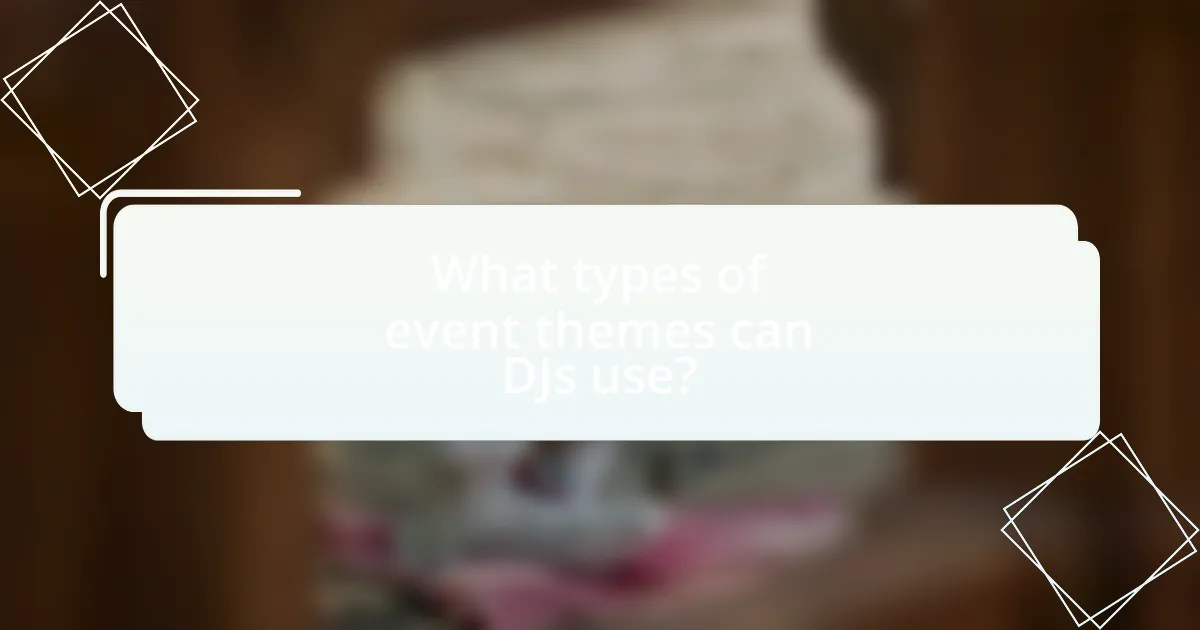
What types of event themes can DJs use?
DJs can use a variety of event themes, including but not limited to, weddings, corporate events, birthday parties, holiday celebrations, and themed parties such as 80s retro, masquerade, or tropical luau. Each theme allows DJs to tailor their music selection, lighting, and overall atmosphere to enhance the guest experience. For instance, a wedding theme typically involves romantic music and elegant decor, while a corporate event may focus on upbeat tracks that encourage networking and engagement. Themed parties, like an 80s retro event, often feature music from that era, encouraging guests to dress accordingly and creating a nostalgic atmosphere.
How do different themes cater to various audiences?
Different themes cater to various audiences by aligning the event’s atmosphere, music, and activities with the preferences and interests of specific demographic groups. For instance, a retro theme may attract older audiences who appreciate nostalgia, while a modern electronic theme may appeal to younger crowds seeking contemporary experiences. Research indicates that tailored themes can enhance audience engagement; a study by the Event Marketing Institute found that 84% of attendees prefer events that reflect their personal interests and lifestyles. This alignment between theme and audience preferences fosters a more immersive and enjoyable experience, ultimately leading to higher satisfaction and repeat attendance.
What are popular themes for weddings and private parties?
Popular themes for weddings and private parties include rustic, vintage, beach, garden, and modern minimalist. The rustic theme often features natural elements like wood and burlap, creating a cozy atmosphere. Vintage themes draw inspiration from past decades, incorporating antique decor and classic color palettes. Beach themes utilize coastal elements such as seashells and tropical colors, ideal for seaside celebrations. Garden themes emphasize floral arrangements and greenery, providing a romantic outdoor setting. Modern minimalist themes focus on clean lines and simplicity, often using monochromatic color schemes and sleek decor. These themes are widely recognized for their ability to create memorable experiences, enhancing the overall ambiance of events.
Which themes work best for corporate events and festivals?
The best themes for corporate events and festivals include technology innovation, sustainability, and cultural diversity. These themes resonate well with attendees, fostering engagement and connection. For instance, technology innovation themes can showcase cutting-edge advancements, appealing to industries focused on growth and development. Sustainability themes highlight eco-friendly practices, aligning with corporate social responsibility goals, as evidenced by a 2021 survey indicating that 70% of consumers prefer brands committed to sustainability. Cultural diversity themes celebrate inclusivity, enhancing team cohesion and reflecting a globalized workforce. These themes not only enhance the event experience but also align with current corporate values and societal trends.
What are some unique and creative theme ideas for DJs?
Unique and creative theme ideas for DJs include a retro disco night, a masquerade ball, a tropical luau, and a futuristic cyberpunk party. A retro disco night can feature classic disco hits and vibrant lighting, creating a nostalgic atmosphere that encourages dancing. A masquerade ball theme allows guests to wear masks, adding an element of mystery and elegance, while the DJ can play a mix of contemporary and classical music. A tropical luau can incorporate island-inspired decorations and reggae or calypso music, providing a relaxed and festive vibe. Lastly, a futuristic cyberpunk party can utilize neon lights and electronic music, immersing attendees in a high-tech, imaginative environment. These themes not only enhance the overall experience but also encourage guest participation and engagement, making events memorable.
How can DJs incorporate cultural themes into their events?
DJs can incorporate cultural themes into their events by selecting music that reflects specific cultural traditions and integrating visual elements that represent those cultures. For instance, a DJ can curate a playlist featuring traditional songs, contemporary hits, and remixes from a particular culture, ensuring a diverse representation that resonates with attendees. Additionally, incorporating cultural visuals, such as decorations, attire, and multimedia presentations, can enhance the thematic experience. Research indicates that events that authentically represent cultural themes can increase attendee engagement and satisfaction, as seen in festivals that celebrate cultural diversity, which attract larger audiences and foster community connections.
What role does nostalgia play in theme selection?
Nostalgia plays a significant role in theme selection by evoking emotional connections that enhance audience engagement. When DJs incorporate nostalgic themes, such as music from specific decades or cultural references, they tap into shared memories that resonate with attendees, creating a sense of familiarity and comfort. Research indicates that nostalgia can increase feelings of social connectedness and happiness, which are crucial for memorable experiences at events. For instance, a study published in the journal “Emotion” by Wildschut et al. (2006) found that nostalgic recollections can foster a sense of belonging and improve mood, making nostalgic themes particularly effective in event planning for DJs.
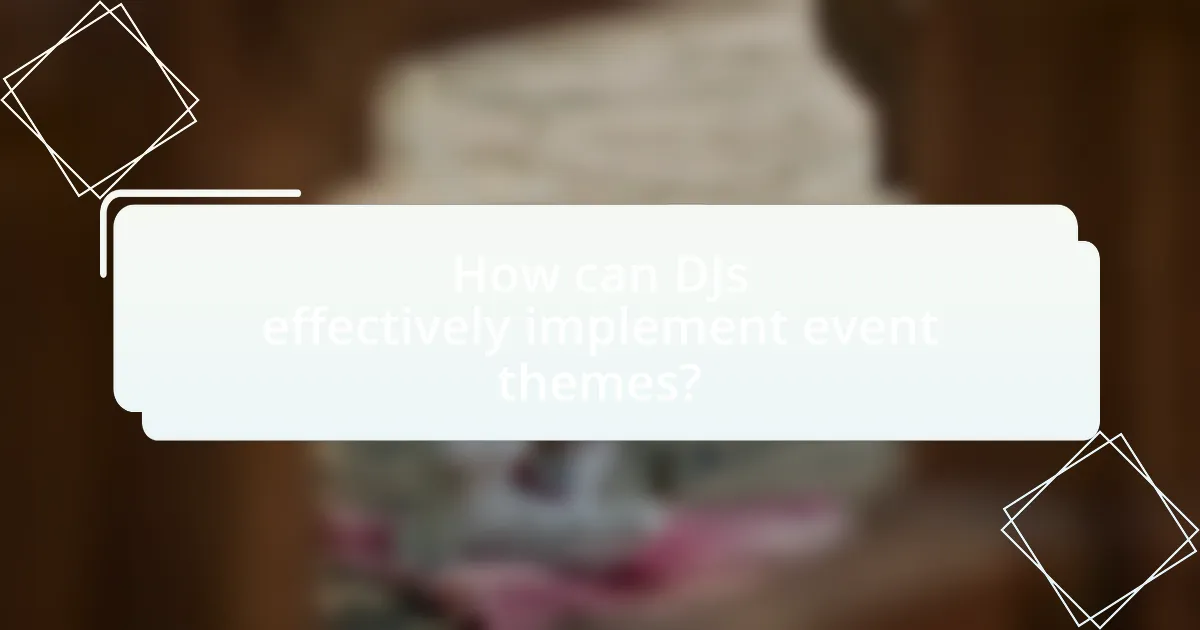
How can DJs effectively implement event themes?
DJs can effectively implement event themes by aligning their music selection, visual elements, and audience engagement strategies with the chosen theme. For instance, if the theme is a retro 80s party, the DJ should curate a playlist featuring iconic tracks from that era, incorporate visuals like neon lights and retro graphics, and encourage attendees to dress in 80s attire. This cohesive approach enhances the overall experience, making it memorable for participants. Research indicates that thematic consistency in events significantly boosts attendee satisfaction and engagement, as highlighted in studies on event marketing effectiveness.
What steps should DJs take to plan a themed event?
DJs should take several key steps to effectively plan a themed event. First, they must select a theme that resonates with the target audience, ensuring it aligns with their interests and preferences. Next, DJs should curate a playlist that reflects the chosen theme, incorporating relevant genres and tracks that enhance the overall atmosphere. Additionally, DJs need to coordinate with event planners or venues to ensure that the theme is visually represented through decorations, lighting, and other elements. Finally, promoting the themed event through social media and other marketing channels is crucial to attract attendees and generate excitement. These steps are essential for creating a cohesive and memorable experience that engages the audience.
How can DJs collaborate with event planners for theme execution?
DJs can collaborate with event planners for theme execution by aligning their music selection and performance style with the event’s theme. This collaboration involves DJs discussing the theme details with event planners to understand the desired atmosphere, which allows them to curate playlists that enhance the overall experience. For instance, if the theme is a 1980s retro party, the DJ can focus on tracks from that era, incorporating visual elements like themed lighting and costumes that resonate with the audience. This synergy not only elevates the event but also ensures that the music complements the decor and activities, creating a cohesive experience for attendees.
What tools and resources are available for theme development?
For theme development in the context of creating memorable experiences for DJs, several tools and resources are available. Software such as Adobe Creative Suite (including Photoshop and Illustrator) allows for graphic design and visual content creation, essential for branding and promotional materials. Additionally, platforms like Canva provide user-friendly templates for quick design solutions.
Event planning tools like Eventbrite and Meetup facilitate organization and promotion of themed events, while music production software such as Ableton Live and FL Studio enables DJs to create custom soundscapes that align with their themes. Online resources, including forums and communities like DJ TechTools and Reddit’s DJ subreddit, offer valuable insights and peer support for theme development.
These tools and resources collectively enhance the ability to create engaging and cohesive event themes, ensuring a memorable experience for attendees.
How can DJs adapt themes to different venues?
DJs can adapt themes to different venues by analyzing the venue’s atmosphere, audience demographics, and acoustics. For instance, a rooftop venue may call for a more laid-back, chill vibe, while a nightclub requires high-energy beats. DJs can also customize their playlists and visuals to align with the venue’s aesthetic, ensuring a cohesive experience. Research indicates that audience engagement increases when the music and environment are harmonized, as seen in events where DJs successfully matched their themes to venue characteristics, enhancing overall satisfaction and participation.
What considerations should DJs keep in mind for outdoor vs. indoor events?
DJs should consider sound quality, equipment protection, and audience engagement when performing at outdoor versus indoor events. For outdoor events, sound systems must be powerful enough to overcome environmental noise and may require additional equipment like windshields for microphones. Additionally, DJs need to protect their gear from weather elements such as rain or extreme heat, which can damage electronic equipment. In contrast, indoor events typically offer controlled acoustics and a stable environment, allowing for more precise sound mixing and less concern about equipment exposure. Audience engagement strategies may also differ; outdoor events often require more dynamic interaction due to larger spaces, while indoor settings can facilitate closer connections with attendees.
How can venue layout influence theme presentation?
Venue layout significantly influences theme presentation by dictating the flow of movement, sightlines, and interaction among attendees. A well-designed layout can enhance the thematic elements, such as decor and lighting, making them more impactful. For instance, an open space allows for immersive experiences where guests can engage with the theme through various installations, while a segmented layout may create distinct areas that highlight different aspects of the theme. Research indicates that spatial arrangement affects audience engagement; a study by the Journal of Environmental Psychology found that environments designed with clear pathways and focal points lead to increased participant satisfaction and thematic resonance. Thus, the venue layout is crucial in shaping how effectively a theme is communicated and experienced.
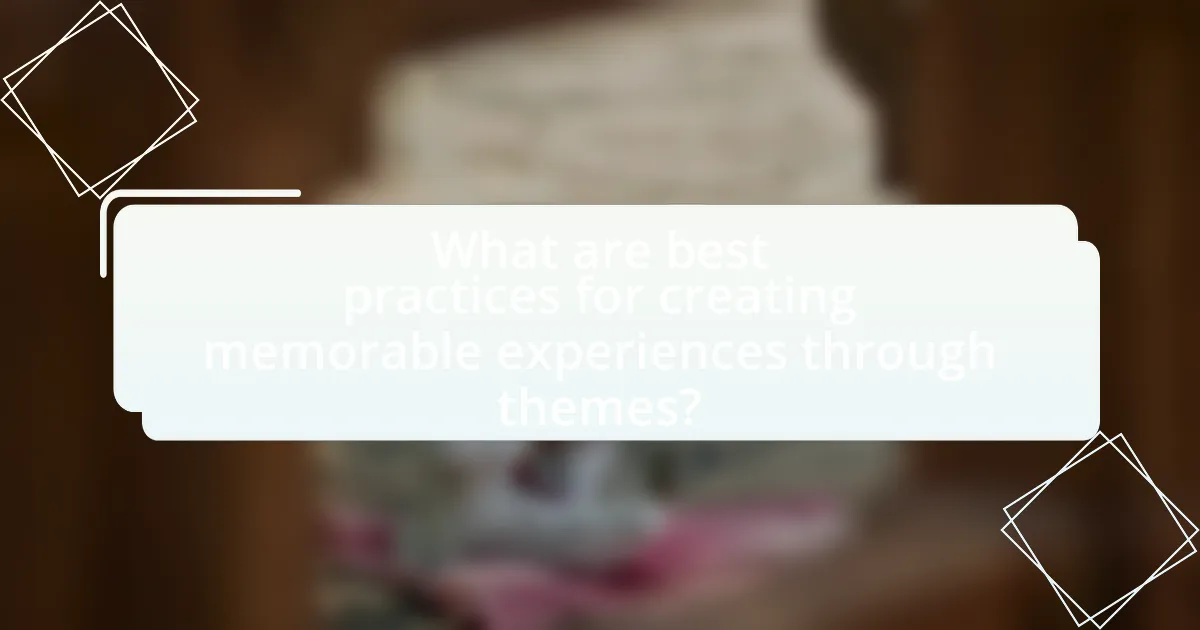
What are best practices for creating memorable experiences through themes?
Best practices for creating memorable experiences through themes include selecting a cohesive theme that resonates with the audience, integrating sensory elements, and ensuring interactive engagement. A cohesive theme, such as a specific decade or cultural motif, helps unify the event and makes it relatable, enhancing emotional connections. Integrating sensory elements like music, lighting, and decor can evoke specific feelings and memories, making the experience more immersive. Interactive engagement, such as audience participation or themed activities, fosters a sense of community and involvement, which is crucial for lasting memories. Research indicates that events with strong thematic elements can increase attendee satisfaction by up to 30%, highlighting the importance of these practices in event planning.
How can DJs engage their audience during themed events?
DJs can engage their audience during themed events by incorporating interactive elements such as live polls, requests, and themed contests. These strategies encourage audience participation and create a dynamic atmosphere. For instance, using social media platforms to conduct live polls allows attendees to influence song selections, fostering a sense of involvement. Additionally, themed contests, such as costume competitions, can enhance the overall experience by encouraging attendees to immerse themselves in the theme, thereby increasing engagement and enjoyment. Research indicates that interactive experiences significantly boost audience satisfaction and retention, making these methods effective for DJs aiming to create memorable events.
What interactive elements can enhance the theme experience?
Interactive elements that can enhance the theme experience include live polling, audience participation activities, and immersive technology such as augmented reality. Live polling allows attendees to engage in real-time feedback, making them feel involved in the event’s direction. Audience participation activities, such as dance-offs or karaoke, foster a sense of community and excitement. Immersive technology, like augmented reality, can create unique visual experiences that align with the event’s theme, enhancing overall engagement. These elements have been shown to increase attendee satisfaction and retention, as evidenced by studies indicating that interactive experiences lead to higher levels of enjoyment and connection among participants.
How can DJs use lighting and visuals to support the theme?
DJs can use lighting and visuals to support the theme by synchronizing their light shows and visual displays with the music and overall atmosphere of the event. This synchronization enhances the emotional impact of the performance, making the experience more immersive for the audience. For example, using color schemes that match the event’s theme—such as warm tones for a tropical party or cool hues for a winter event—can reinforce the desired mood. Additionally, incorporating thematic visuals, like animations or video backdrops that reflect the event’s concept, can further engage attendees and create a cohesive experience. Studies show that well-coordinated lighting and visuals can increase audience enjoyment and retention of the event, making it more memorable.
What common challenges do DJs face with event themes?
DJs commonly face challenges such as aligning their music selection with the event theme, managing audience expectations, and ensuring technical compatibility with venue requirements. Aligning music with the theme is crucial; for instance, a 1980s-themed party requires specific tracks that resonate with that era, which can limit a DJ’s usual repertoire. Managing audience expectations involves understanding the demographic and preferences of attendees, as a mismatch can lead to dissatisfaction. Additionally, technical compatibility is vital; DJs must ensure their equipment can support the venue’s sound system and lighting, which can vary significantly across different locations. These challenges highlight the need for DJs to be adaptable and well-prepared to create memorable experiences that align with event themes.
How can DJs overcome budget constraints when planning themes?
DJs can overcome budget constraints when planning themes by utilizing cost-effective resources and creative strategies. For instance, they can leverage free or low-cost venues, collaborate with local businesses for sponsorships, and use DIY decorations to enhance the theme without significant expenses. Additionally, DJs can focus on digital marketing and social media to promote events at minimal cost, thereby attracting larger audiences without heavy financial investment. According to a survey by Eventbrite, 70% of event organizers reported that partnerships and sponsorships significantly reduced their overall costs, demonstrating the effectiveness of collaboration in budget management.
What strategies can DJs use to manage client expectations?
DJs can manage client expectations by establishing clear communication from the outset. This involves discussing the client’s vision, preferences, and any specific requirements during initial consultations. By setting realistic timelines and outlining the services provided, DJs can ensure clients understand what to expect. Additionally, providing examples of past events and sharing playlists can help align expectations with the DJ’s capabilities. Regular check-ins leading up to the event can further reinforce understanding and address any concerns. Research indicates that effective communication significantly enhances client satisfaction in service industries, including event planning.
What tips can DJs follow to ensure successful themed events?
DJs can ensure successful themed events by thoroughly researching the theme and curating a playlist that aligns with it. Understanding the theme allows DJs to select tracks that resonate with the audience and enhance the overall experience. For example, a 1980s-themed event would benefit from including iconic hits from that decade, creating nostalgia and engagement among attendees. Additionally, incorporating visual elements such as themed decorations and lighting can further immerse guests in the experience, as studies show that a cohesive atmosphere significantly enhances event enjoyment.
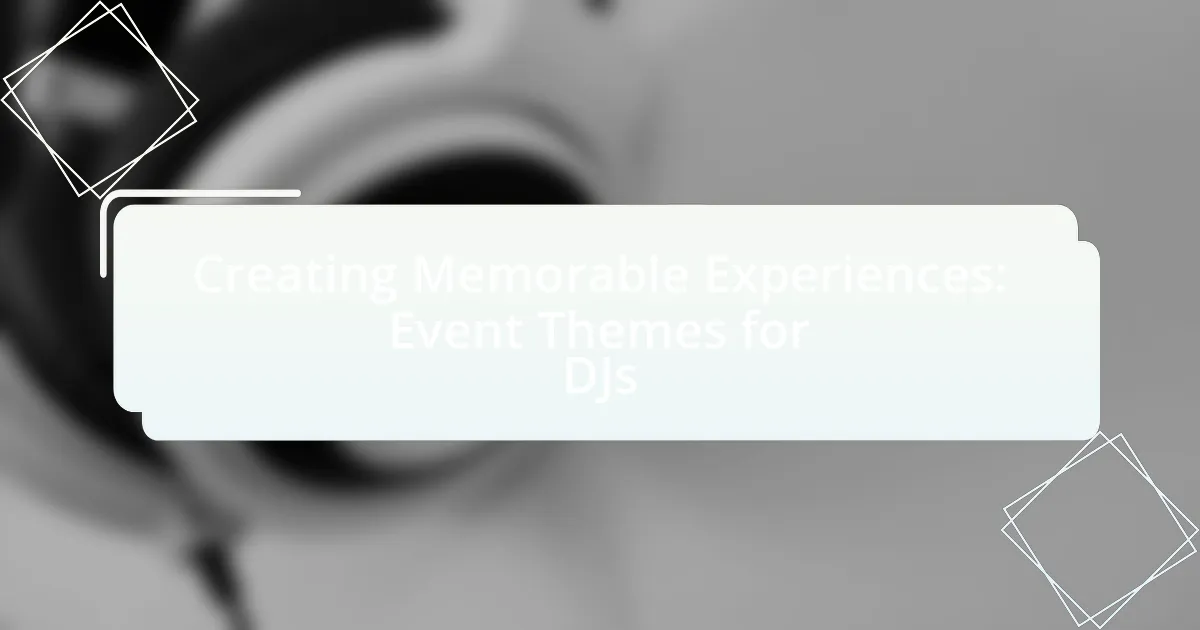
Leave a Reply